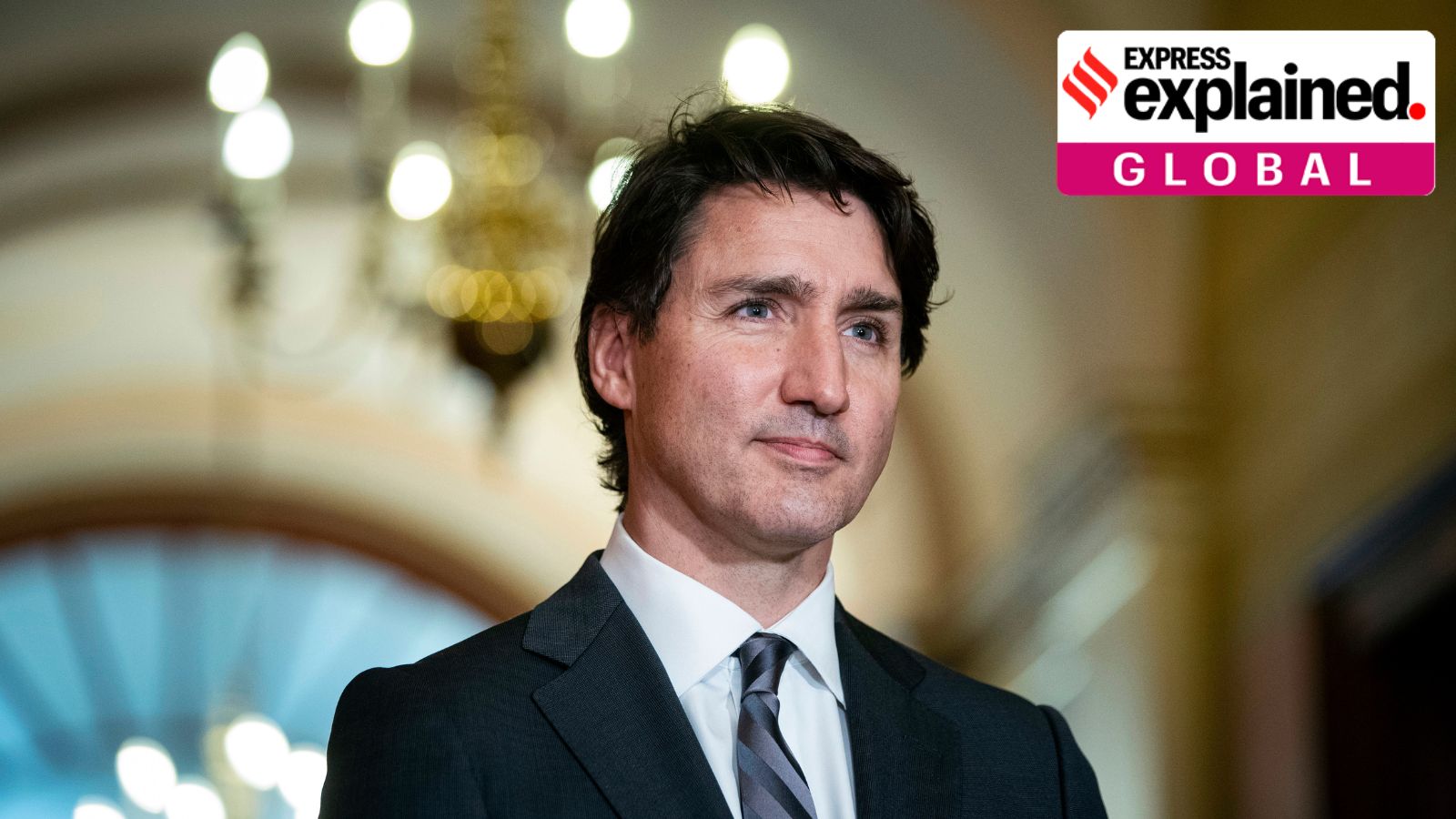Before diplomatic row, Canada probed ‘Indian interference in elections’: what that report said
A report in May 2024 by Canada’s Foreign Interference Commission named India as an actor that 'meddled with Canadian general elections in 2019 and 2021'. We explain what the report was, what it said about India.
 The Foreign Interference Commission, constituted by Prime Minister Justin Trudeau (pictured here) named India as one of the countries that had interfered in Canadian elections. (NYT File Photo - Al Drago)
The Foreign Interference Commission, constituted by Prime Minister Justin Trudeau (pictured here) named India as one of the countries that had interfered in Canadian elections. (NYT File Photo - Al Drago)India on Monday (October 14) dismissed Canada’s claims that agents of the Indian government had “relied on clandestine information-gathering techniques, coercive behaviour targeting South Asian Canadians and involvement in a dozen threatening and violating acts including murder”. This marks the latest development in a year-long row between the two countries, which began with Canada alleging Indian involvement in the assassination of Hardeep Singh Nijjar.
In a press conference on Monday, Royal Canadian Mounted Police (RCMP) Commissioner Mike Duheme also accused Indian officials of “interference into democratic processes”.
In May 2024, a preliminary report prepared by Canada’s Foreign Interference Commission had identified India as one of the foreign actors that interfered with Canada’s federal general elections in 2019 and 2021. The report also named China as “a main perpetrator of foreign interference against Canada” and Pakistan for its interest in “Canada-based groups and individuals that can be leveraged as proxy agents against India.”
Why was the commission formed?
The Foreign Interference Commission (FIC) defines foreign interference as “clandestine, deceptive, or personally threatening activities by a foreign state, or those acting on its behalf, that are detrimental to the interests of Canada.”
Canada was first alerted to the possibility of foreign interference following reports of Russian meddling in the 2016 US presidential election and the 2017 French presidential election. Canadian Prime Minister Justin Trudeau constituted the FIC led by Justice Marie-Josée Hogue through an Order in Council in September 2023. Among other things, the commission was tasked with identifying whether major actors like China and Russia had interfered in the 2019 and 2021 federal general elections, and how these elections were thus affected.
The FIC submitted its Initial Report on May 3 this year, and is expected to submit a final version – which will assess Canada’s current capabilities in addressing foreign interference – by December 31.
And what did the FIC conclude in its Initial Report?
The FIC’s Initial Report observes that while there was foreign interference, its extent did not “undermine the integrity of the electoral system”. The report cites instances of local elections that may have been affected in the process.
The report says that foreign interference affected the rights of Canadian citizens to a free and fair election, and sought to undermine public confidence in Canadian democracy. This reportedly affected different diaspora communities differently.
What does the report say about India’s involvement?
The report identifies India as a major foreign actor involved in foreign interference.
Extent of interest: The report says, “Indian officials, including Canada-based proxies, engage in a range of activities that seek to influence Canadian communities and politicians. These activities include foreign interference, which aim to align Canada’s position with India’s interests on key issues, particularly with respect to how the Indian government perceives Canada-based supporters of an independent Sikh homeland (Khalistan).” Additionally, the report mentions that Indian surveillance targets members of the Indo-Canadian communities and “prominent non-Indo-Canadians”, and that these activities are still significant while not “directed at influencing Canada’s democratic institutions”.
On India’s interest in the Canadian Khalistani community: The report says India’s interest in Canada’s large South Asian community is focused on sections that foster anti-India sentiment and threaten India’s stability and national security, particularly members of the Khalistani community. It says “India does not differentiate between lawful, pro-Khalistani political advocacy and the relatively small Canada-based Khalistani violent extremism. It views anyone aligned with Khalistani separatism as a seditious threat to India.”
Role of proxies: According to the report Canada-based Indian officials have relied on locally based proxies and contacts to conduct foreign interference to erase any evidence of direct Indian involvement. It says “Proxies liaise and work with Indian intelligence officials in India and in Canada, taking both explicit and implicit direction from them.”
India’s hand in the 2019 and 2021 general elections: According to the report, Indian proxy agents may have relied on “the clandestine provision of illicit financial support to various Canadian politicians” without their knowledge to ensure the presence of pro-India candidates, or to influence them.
However, the report observes that there was “no indication of Indian-based disinformation campaigns in the 2021 general election.”
And what does the report say about Chinese involvement?
The report has identified China as “a main perpetrator of foreign interference against Canada”, with the Canada Security Intelligence Service (CSIS) viewing China as the “biggest threat to the Canadian electoral space by a significant margin”.
According to the report, China relies on the Chinese Communist Party (CCP) and Chinese government bodies, locally based Chinese officials and their proxies to monitor “diaspora communities and transnational repression”. Additionally, it also says that China engages in Canadian electoral interference by financially supporting preferred candidates”.
The report also says Chinese involvement in Canada’s 2019 and 2021 elections “exceeded those of other states”. Chinese support was reportedly party-agnostic, supporting only “outcomes that it views as pro-PRC, regardless of the political affiliation of a particular candidate.” It says this was particularly true in 2019, while the 2021 elections saw support by some Chinese officials “for a minority Liberal government because they viewed minority governments as being more limited in terms of being able to enact anti-China policies”.
According to the report, China targets individuals perceived as “having status or influence in Canada. This includes community and business leaders, academics, current and former elected officials, and members of both the traditional and online media.”
- 01
- 02
- 03
- 04
- 05






































